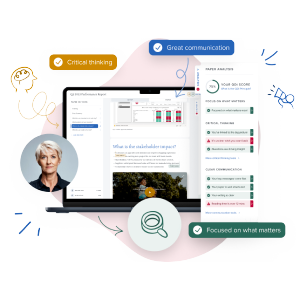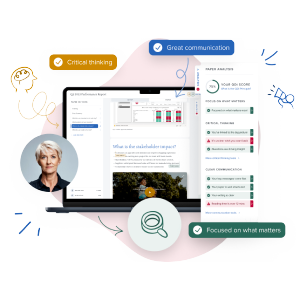Douglas van den Aardweg is chair of HSBC Life UK and Daiwa Capital Markets Europe. He is also a non-executive director of Marks & Spencer Bank, and deputy chair of The Alliance, a joint operation between Bioversity International and the International Center for Tropical Agriculture.
Was there a moment in your life that defines you?
In February 1990, I was living in South Africa when President F. W. de Klerk gave his “Quantum Leap” speech, in which he unbanned the African National Congress and announced the release of Nelson Mandela. That was a defining moment for every South African — we’d all be in a different place if it weren’t for that speech.
It opened the borders of the country — the company I was with branched internationally and listed in London, where I then moved. But it also opened up the people. I remember standing six hours in the queue to vote for our first free election — you don’t forget these things.
If you could wave a magic wand, how would you make boards more effective?
The key is full participation on all the options the board has to choose between.
It’s the chair’s job to achieve this, by pulling out the views of every board member — whether they are extroverts or introverts. In my world you always get boards full of accountants or actuaries, and they tend to be introverts compared to sales or marketing professionals. But you need to hear their point of view, and that requires giving them the appropriate space.
“If you don’t involve everyone, then you cannot possibly consider all the options — including that of doing nothing.”
If you don’t involve everyone, then you cannot possibly consider all the options — including that of doing nothing, which is an alternative (and a risk) that’s too often missed. For instance, if you take the recent movement around the death of George Floyd, what would it mean for a board to do and say nothing on the subject? You need to have that discussion to realise the full implications of your decisions — or lack thereof.
How do you bring introverts into the now-remote conversation?
I usually send a note prior to the meetings, where I tell directors, “I’ve been through the papers, here’s what, I think, we need to be aware of, and here’s what I want to get from you.” That way, they know in advance the key items we’ll be discussing and can focus their time accordingly.
Since we’ve started to work from home, I’ve limited the number of people external to the board giving presentations. I find this doesn’t work as well online, so the executive directors are now presenting — which means they do their homework and master the subjects being discussed ahead of the meeting.
“I’m cautious of directors chipping in when they wish, as it’s usually how extroverts eat up the time at the expense of others.”
Finally, I’m cautious of directors chipping in when they wish, as it’s usually how extroverts eat up the time at the expense of others. Most meeting tools include a “hand-raising” feature, so we use this to deal with questions when the moment is right. And if I see someone hasn’t clicked that button, I’ll make sure to call that person out by name and ask for his or her view.

What would your perfect board pack look like?
How the executive committee operates will define the amount and type of papers that go into the board pack. So, if you work together on improving their governance processes, it will then filter through to the board in the form of better board papers.
“Information in the pack shouldn’t leave room for assumptions — either in the story it tells or in what it leaves out.”
Whether digital or paper, information in the pack shouldn’t leave room for assumptions — either in the story it tells or in what it leaves out. For example, if you’re only telling the board what’s going well, I’ll assume everything is dandy, but how much is going awry that the board is not aware of? Assumptions can shape your thinking, and unvarnished, honest information reduces the need to assume.
A good narrative is key in that regard, which is why I’m wary of PowerPoints as they leave a lot of room for interpretation and each director will take different things from it. Think of Steve Jobs, who barely tolerated words on his slides: That’s great for letting your mind make assumptions about Apple products, but it isn’t what you want in a board meeting.
We’re entering a recession, in the middle of a pandemic, whilst demands for racial equality and wealth redistribution are rocking society. What important questions should boards be asking right now?
These are not easy times, and the very first question chairs should ask their non-executive directors is, “Do you, as an individual with your own personal strains, have the time, the mental space, and the appetite to contribute to this organisation right now?” It’s going to take a lot of effort and emotional energy to sort out the situation we’re in, and chairs should be mindful of what their directors could be going through — be it family members losing their jobs, health issues but no access to the NHS, kids who can’t attend school, or any other struggle.
“For years, we’ve all been saying, “Our people are our greatest asset”, and now the chickens have come home to ‘roast’!”
The second question relates to staff. For years, we’ve all been saying, “Our people are our greatest asset,” and now the chickens have come home to “roast”! So, what are we doing to support our employees? And are we dealing with the big challenges of the day, around racism, haves and have-nots, or the way we treat people with disabilities? As boards we can’t set laws or regulations, but we can make a difference — and we shouldn’t be waiting for the Government to tell us what to do.
Specifically, coming from South Africa, I’m painfully aware most companies will include a minority of people who think certain groups are superior to others. They may be keeping quiet, but they’re here. So, how do you change their minds? Going back to that 1990 speech, my first thought at the time was, “Here comes a civil war” — but it never came, and instead I saw the majority of the population change age-old beliefs. The key there was Mandela’s leadership, and the drastic change it introduced, which enabled many South Africans to see the good they couldn’t see before.
What book is on your bedside table?
Island of the Lost, by Joan Druett. It’s a non-fiction about Auckland Island, an incredibly remote place in the middle of the Southern Ocean. In 1864, two ships got shipwrecked on either end of that island at the same time, and what happened to these castaway crews was unbelievably different — all because of their leadership and teamwork.
What is your Golden Rule?
The actual Golden Rule: In everything, do unto others as you would have them do unto you.
We tend to be selective about that and choose the situations where it applies. But the key to that Golden Rule is that it says, “in everything.”
Rapid Fire
Q: In the film about your life, which actor would play you?
A: Christian Bale. He’s exactly the same height as I am, but more importantly he’s renowned for how much he can change his body shape, which might come in useful in portraying me over time!
Q: Most useful app on your phone?
A: PictureThis, a plant identifier. You take a picture of any plant and it will come up with its name, where it grows, the diseases that might affect it… It’s fascinating and so useful.
Q: If you had a spare hour each day, what would you do with it?
A: I’d be spending it outdoors, looking at birds and other animals.
Q: Who is your hero(ine) of fiction?
A: Robin Hood. He is a balance between the ethics of procurement and the compassion of distribution.
Q: What has your family taught you that business couldn’t?
A: My father always told me, “When in Rome, do as at home.” And my kids have taught me to be more spontaneous.
Q: What’s your favourite restaurant?
A: Without a doubt, Snoekies, on the wharf in Hout Bay, Cape Town. I go for their fish and chips every time I’m there.
Q: And your favourite film?
A: Chariots of Fire. A story of commitment, faith, and adversity. It’s uplifting and very relevant today.




